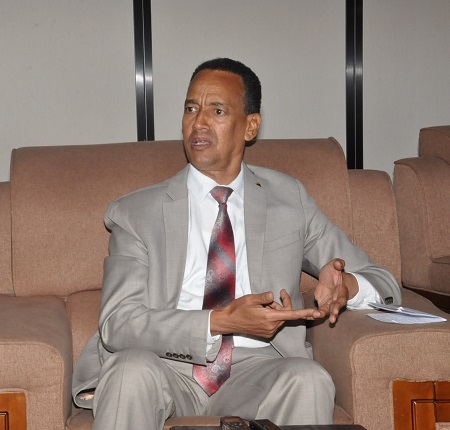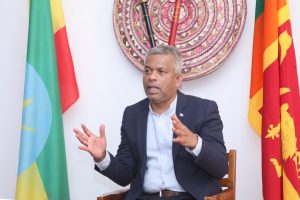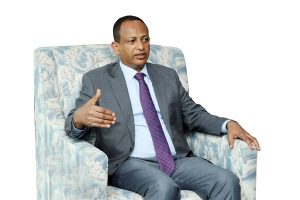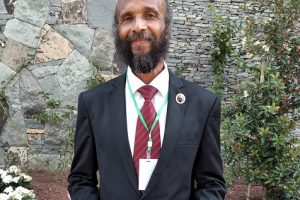
Ambassador Nebil Mehdi
Ever since South Sudan achieved its independence it has exercised strong diplomatic and people to people ties with Ethiopia. The strong ties has its foundation since the time the South Sudanese were fighting for liberation. This has passed the test of time as it started since the reign of emperor Hailesellasie I. All the governments that rules Ethiopia have pursued consistent diplomatic relations and policy towards South Sudan.
The relations between the two countries has now very deep and wide. The two countries collaborate in peace, security, economy, infrastructure and capacity building among others. Today’s Herald Guest is Nebil Mehdi, Ambassador Extraordinary and Plenipotentiary of Ethiopia to South Sudan. He has explained the ongoing activities to maintain the existing strong ties between the two countries and efforts to prolong to the next generation. Have a nice read!
Could you tell us how the overall diplomatic relations between Ethiopia and South Sudan are going?
The foreign policy of Ethiopia gives priority to neighbouring countries. This is because Ethiopia is intertwined with neighbouring countries in language, culture and even religion. This justifies Ethiopia’s formulation of its foreign policy this way. We share language, culture, history, etc.
Ethiopia has played a good role in the independence struggle of South Sudan. Ethiopia has passed through different regimes since the reign of Emperor Haile Selassie. Throughout these times the governments and people of Ethiopia have maintained similar stances for South Sudan. Before South Sudan became an independent country, Emperor Hailesellasie played a decisive role in enabling South Sudan to become a self-administering region within the Sudan in 1972. Colonel Mengistu has also held a similar stance as he has helped South Sudanese Liberation fighters. This is what created the capacity for South Sudan’s liberation. The subsequent Ethiopian leaders Meles Zenawi, Hailemariam Desalgn and PM Abiy have also done a lot for South Sudan. Especially Dr Abiy has enabled the signing of the peace agreement in 2018.
Even after its independence Ethiopia is the only country that stood closely with South Sudan when it faced conflicts. As can be recalled there were sporadic conflicts in South Sudan in 2013 and 2016. Ethiopia is still contributing to the peace and stability of South Sudan as its peacekeeper role is very high for the stability of South Sudan. They have received repeated recognition for their contribution. It has been an icon of pride as witnessed by the UN and the people of South Sudan. The overall work of our peacekeepers has shown their unique capabilities. We are now providing support so that peaceful elections can take place in the country at the end of this year. We are doing our support as part of IGAD.
The support we provide is not limited to ensuring peace but also to bringing about economic integration. If there is no economic integration our ties would not that be meaningful. There was a Memorandum of Understanding signed when the country achieved independence. However, it was not implemented due to various reasons. We are now working to speed up this implementation. There is good progress on our side, but the South Sudanese side lags. The two countries signed a financial agreement in 2015 for the construction of infrastructure like roads. In this regard road construction to Falouj, the south Sudanese oil-producing areas, Ethiopia has taken the initiative under the principle of African Solutions to African problems. Hence without waiting for funding sources like WB and IMF, we are planning the construction so that South Sudan will cover the cost with oil. This way we will construct up to three roads. This 270 km long road will enable it to supply its produce either to Ethiopia or export through Djibouti port.
Ethiopia can also supply electric power to South Sudan. The outputs of the Abbay Dam can serve electricity to South Sudan. Ethiopia is already supplying electricity to Sudan and Djibouti (Kenya). Next South Sudan will also get electricity as the line is being stretched from Gambella to Malakal. The road that connects Ethiopia’s Gambella with Malakal is underway with the support of ADB. It is progressing smoothly. Our interconnection is not only in electricity but also in land-water transport from Gambella to Malakal. We are studying water transportation.
In collaboration with the Ministry of Innovation and Technology, efforts are underway to interconnect the two countries through fibre optics. South Sudan Mobile, which is owned by an Ethiopian investor has been licensed to build the fiber optics.
People-to-people ties are an important area of diplomacy. How far have you gone in invigorating the strong relations between the peoples of the two countries?
Concerning people-to-people ties, since the time of the War of Independence, many fighters and senior government officials have been trained in Ethiopia. Many people in the high-level leadership circle are trained here. We are working on the new generation to create a similar impression about Ethiopia.
Previously Ethiopia used to grant 150 scholarships to South Sudanese citizens annually. Now this number has climbed up to 250. In addition, it gives specialization training for 30 individuals annually. Ethiopian Airlines also flies twice daily for passengers and cargo. It also works within South Sudan from Juba to Malakal. South Sudan’s president also used Ethiopian Airlines as a sign of trust and friendship beyond making business. The green legacy initiative has also been part of the diplomacy. During the last three years due linkage has been formed with the relevant authority in South Sudan and the plantation of trees has been carried out throughout the years. It is being implemented as a benchmark taking the best practices of Ethiopia. This year we changed the focus of the program to schools and started the campaign from there.
Are you working on institutionalizing some of the activities that aim to boost the relations of the two countries?
The final goal of the two countries’ relations is to consolidate the people-to-people ties and ensure the benefit of the people. For instance, during rainy seasons some areas of South Sudan cannot be accessible for supplies from home. They access them instead from Ethiopia’s Gambella and Benishangul. The Lamu Port South Sudan-Ethiopia (LaPSSET) corridor is also a good example of integration. On the Ethiopian side construction of the road has been carried out from Addis to Moyale and from Addis to Gambella. When the road in South Sudan is completed it will reinforce the integration.
Ethiopia and South Sudan share a similar situation as both countries are landlocked. South Sudan has an untapped huge oil reserve. So far it has used only 5% of its potential. It has an oil pipeline, which is 1600 km long that extends to Sudan. This is the only option it has.
By now Ethiopia has also inked a port access deal with Somaliland which doesn’t violate the sovereignty of any country. Ethiopia has also made sacrifices for independence. African countries including Somalia. This port access will further enhance economic integration. Ethiopia, especially the eastern part is highly linked with the ports of Somaliland in the past as many commercial items in Eastern Ethiopia are imported via that route. Therefore, the MoU between Ethiopia and Somaliland is something that reinstates the usual trade ties rather than a new venture. It will also benefit landlocked countries of the Horn of Africa.
The government and people of South Sudan have a good regard for Ethiopia. For instance, during the two years of war in northern Ethiopia, some countries intended to launch an attack against Ethiopia via South Sudan. But South Sudan rejected their proposals as they didn’t want to discuss it at all. So they believe that any development in Ethiopia also benefits them.
Are there attempts by the two governments to solve problems that flare up around the border?
We are working with the Joint Border Commission. The issue of child abduction is something related to the traditional problem rather than a politically motivated operation that violates Ethiopia’s sovereignty. In general, the election in 2024 December is monumental as the transitional government ends its tenure. And it is expected that the country will achieve reliable peace and stability. This will also address problems that appear around borders.
Ethiopia has pioneered the preparation and signing of the Cooperation Framework Agreement (CFA) for the utilization of water resources especially that of the Nile basin. How is South Sudan handling the ratification of the CFA?
The South Sudan Council of Ministers ratified the CFA five years ago. Four years ago it was submitted to the country’s parliament. In the parliament, the first reading has been done. We have also done the necessary awareness-raising work. So the parliament has been convinced that the agenda is not merely that of Ethiopia but of South Sudan, too. IF South Sudan ratifies the agreement, it will become a law. We expect that the parliament of South Sudan will ratify it this year.
The embassy has also carried out a workshop for parliamentarians, pressure groups with higher education, etc. We hope that it will be one of the first agenda when the parliament opens this year in mid-February. IF successfully ratified it will change the colonial period rules. It has no intent to harm the lower basin countries. It will not reduce their water share. But for us, it is meaningful as the majority of our people do not have access to electric light.
Thank you very much for your time!
Thank you!
BY ZEKARIAS WOLDEMARIAM
THE ETHIOPIAN HERALD SATURDAY 27 JANUARY 2024




